8 Dog Breeds With the Worst Health Problems, Vet Tech Warns
These dogs have health and behavioral issues that can make them tough to care for.
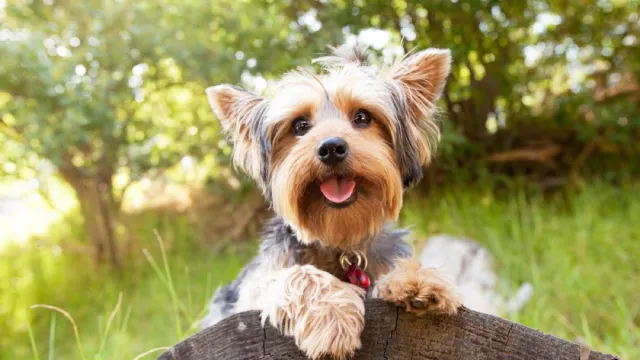
There are countless reasons to adopt a dog: They provide constant companionship, boost our mood, and encourage exercise. But dogs can also be very expensive when you factor in food, toys, pet sitters, and, of course, the occasional steep vet bill. When it comes to healthcare costs, not all dogs are created equal, as many pet owners have learned the hard way. Now, a vet tech has taken to TikTok to share her list of the dog breeds with the worst health problems.
Vet tech student Sierra Towers posted a video to her account @sierra.towers, in which she reveals eight dogs she would never own. "Our breeding genetics are just not it," her caption reads. Most of these dogs have been singled out for breed-specific health issues that could likely lead to hefty vet bills—but there are also some behavioral problems in the mix. Read on to find out which pups could cost you big.
RELATED: 14 Hardest Dog Breeds to Own, Doggy Daycare Worker Says.
1
Great Dane
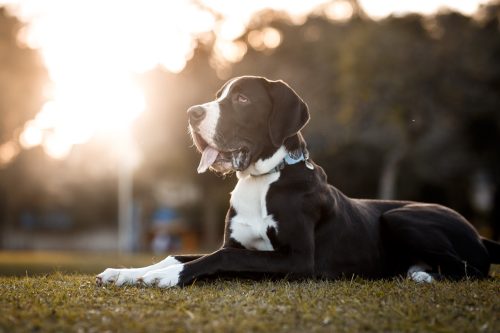
Great Danes are out, Towers says in her video, because they're prone to GDV. For those who don't work in veterinary medicine, GDV stands for gastric dilatation-volvulus.
According to the American College of Veterinary Surgeons (ACVS), GDV is "rapidly progressive life-threatening condition of dogs that requires immediate medical attention. The condition is multifactorial but is commonly associated with rapid ingestion of large meals. The presence of food and gas causes the stomach to significantly dilate and expand, which may have several severe consequences."
And yes, per the ACVS, while GDV can be seen in all breeds, it's most common in Great Danes, along with Weimaraners, St. Bernards, Irish setters, and Gordon setters.
2
Yorkie
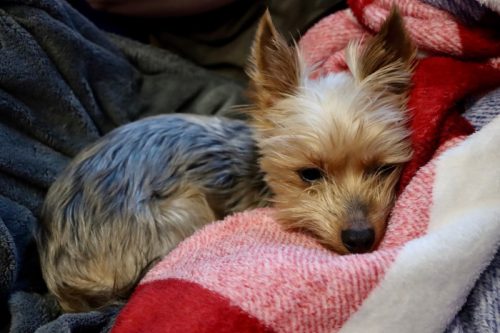
Towers identifies a scary medical condition as a reason she wouldn't own a Yorkie: collapsing trachea.
PetMD explains that tracheal collapse is exactly what it sounds like—the trachea, which is the tube that carrying air through the nose and mouth and into the lungs, flattens. This condition "can make it harder to get air into the lungs and breathe normally. As a result, many dogs with tracheal collapse will make a dry, goose-like honking cough sound."
Once again, it can happen in all dogs, but the Yorkshire Terrier (or Yorkie) is especially prone to it. Other small dogs, like Pomeranians, Chihuahuas, Shih Tzus, and Toy Poodles, are also at risk, PetMD warns.
RELATED: 5 Dog Breeds Most Pet Owners Can't Handle, Vet Warns.
3
Shar-Pei
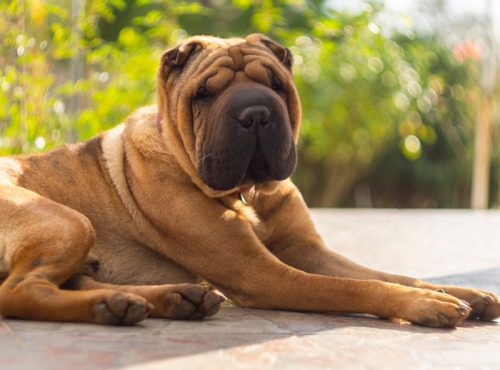
For Shar-Pei, the problem is more behavioral. Towers cites "aggressiveness" as her reason for not wanting to own one of these dogs.
The American Kennel Club (AKC) cautions that Shar-Pei need early socialization and training. "Shar-Pei are serene dogs, but they will meet a perceived threat with tenacity and vigor," these experts note. "A dominant adult Shar-Pei without [training] is a serious problem waiting to happen."
4
Husky
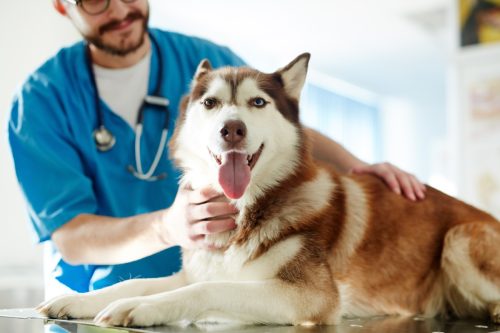
The problem with Huskies? Anxiety, the vet tech says—a health and behavioral problem.
On a list of Siberian Husky behaviors, BeChewy flags separation anxiety as a potential issue. "Your Siberian Husky may howl, whine or otherwise vocalize his displeasure at your leaving the house and his being left alone," these experts share. "Your dog needs to learn that he will be fine on his own for a while and that he will not wither away if he is not attended to every minute of the day."
5
French Bulldog

As for French Bulldogs, Towers warns that they're prone to respiratory distress.
"Like all flat-faced breeds, Frenchies are prone to breathing problems and do poorly in hot or humid weather," the AKC says.
PetPlace elaborates, "Many owners become concerned when they hear their French bulldog breathing heavily, and this may or may not be normal. It could be due to the physical makeup of the dog's airway, or it could be a sign of brachycephalic airway syndrome. This is a condition that is common with French bulldogs and other dogs with short airways and scrunched faces. The problem can range from mild to serious with the most serious cases requiring surgery."
RELATED: 7 Worst Dog Breeds to Own, Vet Tech Says.
6
Dachshund
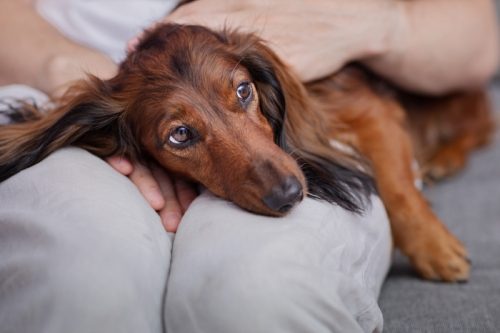
Dachshunds get singled out for IVDD, a term that Towers knows all too well, but that you may not be familiar with. IVDD stands for intervertebral disc disease, and it can be very serious.
The Cornell University College of Veterinary Medicine (CVM) says that IVDD "is a common source of back pain in dogs, especially in older dogs but also in younger dogs of predisposed breeds. The severity and type of disc injury can vary widely, ranging from mild discomfort to paralysis."
At the top of the list of dogs prone to IVDD? Dachshunds, of course. The other breeds that CVM lists are Toy and Miniature Poodles, Pekingese, Lhasa Apsos, Doberman Pinschers, Beagles, Cocker Spaniels, and German Shepherds. And that's not the only health issue German Shepherds face…
7
German Shepherd
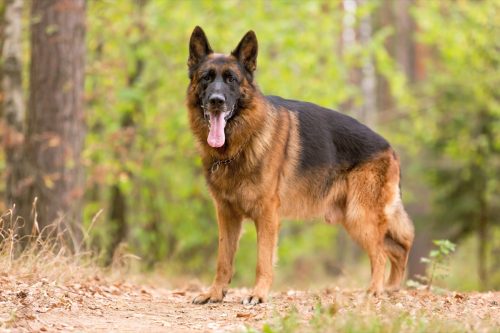
German Shepherds make the vet tech's list of dogs she'd never own not because of IVDD, but rather hip dysplasia.
According to the Orthopedic Foundation for Animals (OFA), hip dysplasia is caused by a hip joint that didn't develop properly or by a traumatic fracture. "With cartilage damage or a hip joint that isn't formed properly, over time the existing cartilage will lose its thickness and elasticity," these experts explain. "This breakdown of the cartilage will eventually result in pain with any joint movement."
The OFA's breed-specific testing statistics show that over 20 percent of German Shepherds have abnormal or dysplastic hips.
8
Greyhound

Towers closes out her TikTok video with Greyhounds. The health issue? Dental disease.
London's Royal Veterinary College reveals that this concern is not overblown: A study by the university revealed that dental disease is the most common health problem facing pet Greyhounds. According to the research, 39 percent of Greyhounds suffer from dental issues, "which is a far higher percentage than for any other dog breed."
For more pet content delivered straight to your inbox, sign up for our daily newsletter.
- Source: https://www.acvs.org/small-animal/gastric-dilatation-volvulus/
- Source: https://www.akc.org/dog-breeds/chinese-shar-pei/
- Source: https://www.akc.org/dog-breeds/french-bulldog/
- Source: https://www.vet.cornell.edu/departments-centers-and-institutes/riney-canine-health-center/canine-health-information/intervertebral-disc-disease
- Source: https://ofa.org/diseases/hip-dysplasia/
- Source: https://ofa.org/chic-programs/browse-by-breed
- Source: https://www.rvc.ac.uk/vetcompass/news/bad-teeth-revealed-as-biggest-problem-for-pet-greyhounds





















